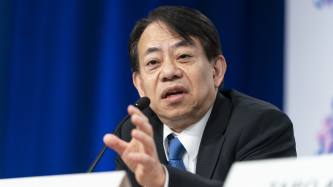At a glance
- The outlook for intraregional trade in Asia is strong, but the recent ship attacks in the Red Sea are impacting supply chains to the rest of the world
- With over 60 elections taking place globally this year, there is scope for disruption, with the risk of widespread disinformation and deepfakes causing anxiety as voters head to the polls
- While China’s growth is slowing, pivoting to quality growth is now proving more important to investors
The strength of regional trade and China’s search for quality growth are two of the bright spots for Asia’s economies in 2024, while geopolitical tensions and the risk posed by deepfakes in elections could derail feelings of optimism for the year ahead.
Speaking at the launch of the Asia House Annual Outlook 2024 report, Ziad Haider, global director of geopolitical risk at McKinsey, said: “Sixty per cent of trade in Asia is happening within Asia. So the ties that bind the region are very strong.”
The report from the think-tank was optimistic, as it noted that “trade flows will pick up in Asia in 2024, owing to digital innovations that will reduce the cost of finance”. The report further stated that “Asia’s economies would also benefit from the trade diversion resulting from ‘friendshoring’ by China as it transfers its business from geopolitical rivals.”
However, the geopolitical issues in the Middle East and Ukraine are tempering optimism. The recent blockades and attacks on vessels in the Middle East by Houthis in Yemen, which have resulted in a military response from the UK and the US, are having a tangible impact on trade flows.
“The geopolitical flashpoints in the Middle East are impacting global trade flows,” said Mr Haider. “A shipment that previously took 26 days to travel from Asia to Europe will now take 36 days, and there has been a 173 per cent increase in spot container shipping rates due to the issues in the Red Sea.”
Jinny Yan, chief China economist at ICBC Standard Bank, said these disruptions can present an opportunity to reevaluate existing flows: “China represents a huge part of global supply chains. There needs to be work on how to maintain resilience. There is an opportunity to not just look at the Asian supply chain, but also how to diversify in some of the sectors that importers depend on.”
Election unease
With more than 60 elections due to take place globally in 2024, Mr Haider cautioned against becoming overwhelmed: “It is easy to get lost in the number of elections that are taking place this year, but the focus should be on which ones are going to keep the continuity and which ones are going to create discontinuity.”
The potential for disruption was apparent when the question of elections had arisen earlier in the event. Zheng Zeguang, China’s ambassador to the UK, reiterated that “Taiwan is part of China and there is only one China in the world”. “China will eventually be reunified,” said Mr Zheng, irrespective of the recent election results in Taiwan, which saw Lai Ching-te of the Democratic Progressive Party named as president.
Meanwhile, UK MP Anne-Marie Trevelyan said in a speech: “China remains incredibly important to the UK both as a trading partner and in tackling global challenges such as climate change. But we are clear-eyed on the need to respond to those systemic challenges which China may pose to our values and interests.”
Beyond politics, the landscape of elections in 2024 is very different to previous years, with the rise of new technology exacerbating the dissemination of fake news.
“The role of artificial intelligence within the elections should be monitored. We saw in Pakistan the significance of Facebook and the use of deepfake videos,” said Mr Haider.
AI’s use was demonstrated when Pakistan’s former leader Imran Khan delivered a speech to his supporters from prison via a deepfake in December 2023, with the AI replicating both his image and voice in the video. Elsewhere, there are concerns of how widespread deepfakes will impact on the upcoming elections in India, Bangladesh and Pakistan, where deepfakes of politicians have spread on social media channels and WhatsApp.
China in focus
Looking specifically at the outlook for the Chinese economy, the current rates of inflation were identified as causing concern.
Ms Yan said: “China has high and sticky inflation, and this will continue in 2024. There will be a lot of attention paid to how monetary policy will affect that, and also the geopolitical issues such as in Ukraine.”
While there is still much debate about China’s slowing GDP growth in recent years, Ms Yan was keen to emphasise the importance of a steady growth: “Clients and institutional investors are looking for quality growth. For them, seeing quality assets and quality growth at 5 per cent is more important than double-digit, low-quality growth. In a slow growth environment where there is a lack of demand and investment, opportunities can emerge on how to produce high-quality growth.”
Key to steady growth is ensuring that support is specific to addressing needs in particular businesses or sectors. “Ever since the onset of Covid there has been a process not just for monetary support where necessary, but targeted support,” said Ms Yan. “China learned from the global financial crisis that supplying unlimited funds is not good enough. The cost is something the future generations have to live with. Instead, we’re looking at rate cutting, the cost of borrowing is extremely low, and we’ve seen the drop in the cost of funding in China. Special purpose bonds have been issued to complete certain projects.”
These include 19 special purpose bonds released in 16 provinces as of December 2023, with a total value of Rmb208.3bn ($29.4bn), to supplement the capital of small and medium-sized banks impacted by falling margins.
With existing concerns about low employment levels and the ageing population, Ms Yan stated economic transformation would depend on the upskilling of the labour force. She pointed to the use of digitalisation and AI to expedite this process.
In turn, the growth of an affluent population will encourage economic momentum, particularly as spending patterns shift to cater to the needs of the sizeable elderly population.
“There is a lot of emphasis on Chinese consumers,” said Ms Yan. “Their disposable income is associated with GDP growth. The unleashing of consumer power as China transitions to a consumption-led economy is extremely crucial for the region and the world.
“How can consumers lift the world out of the low growth environment? The consumer impact on health, welfare and the ageing population are crucial to reach the consumption power and issues that people are spending.”













